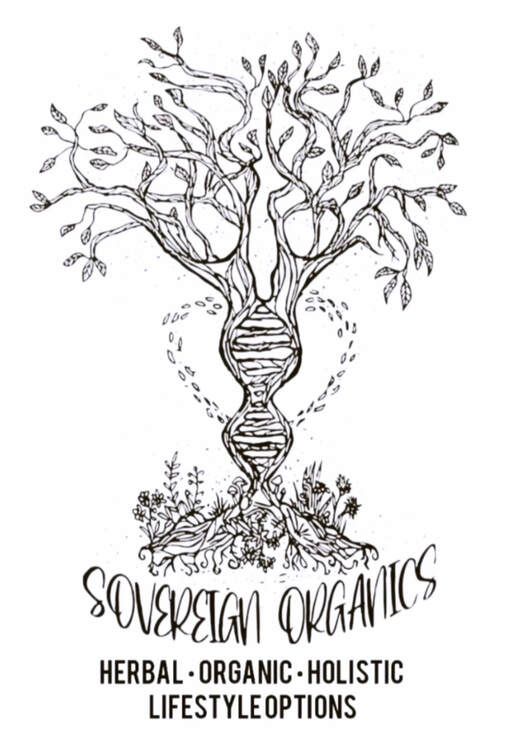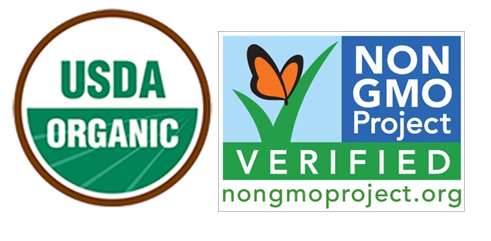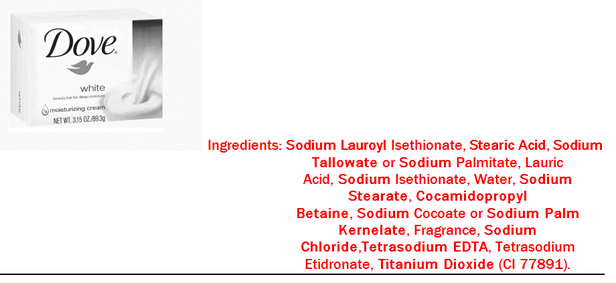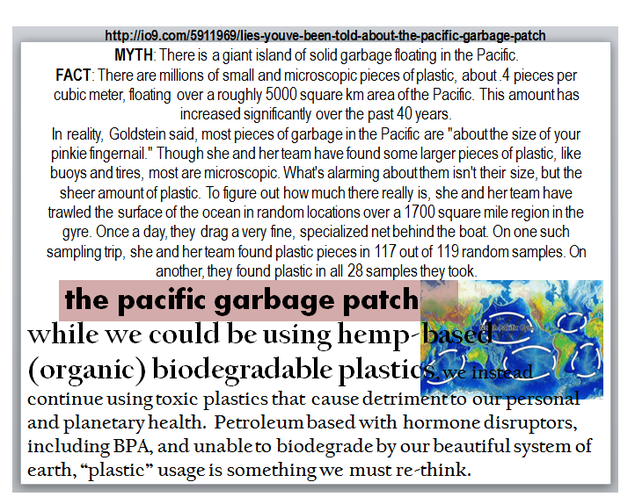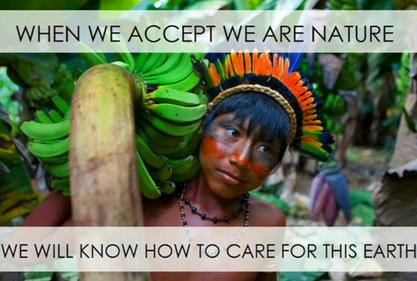
What does it mean to be sustainable: sustainable is a term used to describe a process that does NOT degrade the health of the environment to the extent that the coming generations would not be able to enjoy the natural bounties of that environment
EXAMPLES:
one can say that industrial agriculture in unsustainable because it pollutes the environment and strips the soil of nutrients to the extent that future generations may become sick from consequent pollutants and may not be able to grow healthy vegetation on that land therefore to be sustainable we should endorse ORGANIC small-scale, local agriculture as much as possible
one could say that polluting waterways with chemicals is unsustainable because it can inhibit future generations from being able to get clean water and healthy food sources from that water supply. In order to be sustainable, we must avoid industries that are guilty of polluting our environment with chemicals, boycott known products that contain chemicals & use chemicals in production...
buy ORGANIC as much as possible, these products come from earth and are therefore biodegradable and are easily processed by earth’s naturals processes
one could say that leaving all of your lights on all day when no one is home is unsustainable because you are wasting energy that is in a finite supply (there is an ending, we do not have an infinite supply of FOSSIL FUELS, the source of where the energy is coming from). This fossil fuel energy also emits greenhouse gases into our atmosphere at high rates, which is a cause of climate change. To be sustainable we should try to conserve as much energy as possible and also support the research and usage of alternative energies such as BIOFUELS, WIND ENERGY, SOLAR ENERGY etc..
simple ways to lead a
SUSTAINABLE LIFESTYLE:
| BUY ORGANIC |
What is Organic Agriculture?
Organic agriculture produces products using methods that preserve the environment and avoid most synthetic materials, such as pesticides and antibiotics. USDA organic standards describe how farmers grow crops and raise livestock and which materials they may use.
Organic farmers, ranchers, and food processors follow a defined set of standards to produce organic food and fiber. Congress described general organic principles in the Organic Foods Production Act, and the USDA defines specific organic standards. These standards cover the product from farm to table, including soil and water quality, pest control, livestock practices, and rules for food additives. [1]
LOOK FOR these LABELS
EXAMPLES:
one can say that industrial agriculture in unsustainable because it pollutes the environment and strips the soil of nutrients to the extent that future generations may become sick from consequent pollutants and may not be able to grow healthy vegetation on that land therefore to be sustainable we should endorse ORGANIC small-scale, local agriculture as much as possible
one could say that polluting waterways with chemicals is unsustainable because it can inhibit future generations from being able to get clean water and healthy food sources from that water supply. In order to be sustainable, we must avoid industries that are guilty of polluting our environment with chemicals, boycott known products that contain chemicals & use chemicals in production...
buy ORGANIC as much as possible, these products come from earth and are therefore biodegradable and are easily processed by earth’s naturals processes
one could say that leaving all of your lights on all day when no one is home is unsustainable because you are wasting energy that is in a finite supply (there is an ending, we do not have an infinite supply of FOSSIL FUELS, the source of where the energy is coming from). This fossil fuel energy also emits greenhouse gases into our atmosphere at high rates, which is a cause of climate change. To be sustainable we should try to conserve as much energy as possible and also support the research and usage of alternative energies such as BIOFUELS, WIND ENERGY, SOLAR ENERGY etc..
simple ways to lead a
SUSTAINABLE LIFESTYLE:
| BUY ORGANIC |
What is Organic Agriculture?
Organic agriculture produces products using methods that preserve the environment and avoid most synthetic materials, such as pesticides and antibiotics. USDA organic standards describe how farmers grow crops and raise livestock and which materials they may use.
Organic farmers, ranchers, and food processors follow a defined set of standards to produce organic food and fiber. Congress described general organic principles in the Organic Foods Production Act, and the USDA defines specific organic standards. These standards cover the product from farm to table, including soil and water quality, pest control, livestock practices, and rules for food additives. [1]
LOOK FOR these LABELS
Buying organic ensures that you are not consuming products that contain known cancer causing, toxic chemicals and also was not produced via means that degrade the health of our environment. Earth provides all of the ingredients needed for all species to thrive, there is no need for us to resort to using toxic substances that harm our bodies and our planet.
Buy organic FOOD, HEALTH AND BEAUTY PRODUCTS, AND CLOTHING as much as possible, because most conventional products we grew up using harm us and our environment.
Buy organic FOOD, HEALTH AND BEAUTY PRODUCTS, AND CLOTHING as much as possible, because most conventional products we grew up using harm us and our environment.
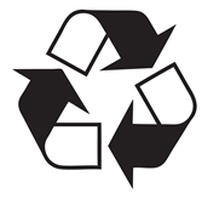
| BUY PLANT-BASED & LOCAL |
Plants are primary producers, making their own food from sunlight, our main energy source. By eating/using only plant based items, you inherently use less energy--- instead of an animal product which takes the energy of a plant product to produce it (livestock eats GMO Corn feed or Grass), eating plants cuts out one extra step of energy usage your meal or beauty product uses up. With a human population of 7+billion and exponentially growing, it is the responsible choice to eat a plant-based diet, especially when you go to a grocery store or restaurant for your meals.
Choosing a vegan lifestyle is a both sustainable and ethical decision in these unique and perpetually arriving moments [especially] if you go get your food at a supermarket. BUY ORGANIC, LOCAL & SEASONAL as much as possible, research about local organic farms/farmers markets in your area give them a call or visit!
IF YOU WOULD LIKE TO LEARN MORE ABOUT WHY RIGHT NOW IS THE TIME TO TRANSITION TO EATING A PLANT-BASED DIET check out this article
| GROW ORGANIC AT HOME |
it is our rite and our duty as human beings to cultivate the land and provide nutritious food for our household and our community. By growing our own food at home, not only do we get nutritious food, but we also increase the health of our environment by promoting a diverse habitat, providing food for other species as well. Growing organic means we leave out all toxic, unnatural chemicals out of crops. Veganic is best, utilizing only plant-based products in cultivation.
Search #HASHTAGS on INSTAGRAM for inspiration #growGardensNotLawns #growYourOwn #organic
An awesome resource for all things @ HOME gardening, check out
FOOD IS FREE
| BUY FRESH
NON-PROCESSED FOODS & MAKE HOMEMADE MEALS AS MUCH AS POSSIBLE |
As a culture, we have undoubtedly slipped into a fast-paced, quick-fix type of lifestyle. This reality has changed making homemade meals from the daily norm to a special occasion. By making our own foods we do not only provide a, most-likely, more healthy meal option for our family, but we are able to ensure that our ingredients are not the products of environmental degradation.
Making meals at home encourages family time and also teach children how to prepare food and provide nutrition for themselves, the number one determinate to survival on this planet. Leading by example is the greatest way to teach, cooking in the home helps in more ways than one for sure.
Some awesome inspiration for HOMECOOKED meal ideas can be found on INSTAGRAM SEARCH #HASHTAGS #veganmeal #veganProtein #veganEats #whatVegansEat
GOOGLE vegan meal ideas
Some awesome, sustainable brands include SUNWARRIOR, SIMPLY ORGANIC,MEGAFOODS, NUTIVA, BOBS REDMILL
USE LESS | REUSE | RECYCLE
Everything we do requires a transformation of energy. The less energy we require per transformation, the more sustainable our action is.
We should use less, gratefully, knowing we are fulfilling our duty to take care of our environment.
THAT INCLUDES TURNING OFF/USING LESS LIGHTS/ELECTRICITY AND WATER
We should learn to re-purpose things into new usable items, RESEARCH: UPCYCLING
WE MUST AT ALL TIMES RECYCLE OUR PLASTICS/METALS/GLASS/PAPER
We are at a dire point at the health of our environment, particularly our oceans, at the hand of our plastic usage.
SAY NO TO PLASTIC BAGS
USE GLASS AS MUCH AS POSSIBLE
NEVER EVER LITTER, throwing garbage away in a garbage can has its own set of issues; do not add to it by throwing it onto a ground that ends up in a waterway or in the digestive tract of wildlife.
RESEARCH THE GREAT PACIFIC GARBAGE PATCH
Plants are primary producers, making their own food from sunlight, our main energy source. By eating/using only plant based items, you inherently use less energy--- instead of an animal product which takes the energy of a plant product to produce it (livestock eats GMO Corn feed or Grass), eating plants cuts out one extra step of energy usage your meal or beauty product uses up. With a human population of 7+billion and exponentially growing, it is the responsible choice to eat a plant-based diet, especially when you go to a grocery store or restaurant for your meals.
Choosing a vegan lifestyle is a both sustainable and ethical decision in these unique and perpetually arriving moments [especially] if you go get your food at a supermarket. BUY ORGANIC, LOCAL & SEASONAL as much as possible, research about local organic farms/farmers markets in your area give them a call or visit!
IF YOU WOULD LIKE TO LEARN MORE ABOUT WHY RIGHT NOW IS THE TIME TO TRANSITION TO EATING A PLANT-BASED DIET check out this article
| GROW ORGANIC AT HOME |
it is our rite and our duty as human beings to cultivate the land and provide nutritious food for our household and our community. By growing our own food at home, not only do we get nutritious food, but we also increase the health of our environment by promoting a diverse habitat, providing food for other species as well. Growing organic means we leave out all toxic, unnatural chemicals out of crops. Veganic is best, utilizing only plant-based products in cultivation.
Search #HASHTAGS on INSTAGRAM for inspiration #growGardensNotLawns #growYourOwn #organic
An awesome resource for all things @ HOME gardening, check out
FOOD IS FREE
| BUY FRESH
NON-PROCESSED FOODS & MAKE HOMEMADE MEALS AS MUCH AS POSSIBLE |
As a culture, we have undoubtedly slipped into a fast-paced, quick-fix type of lifestyle. This reality has changed making homemade meals from the daily norm to a special occasion. By making our own foods we do not only provide a, most-likely, more healthy meal option for our family, but we are able to ensure that our ingredients are not the products of environmental degradation.
Making meals at home encourages family time and also teach children how to prepare food and provide nutrition for themselves, the number one determinate to survival on this planet. Leading by example is the greatest way to teach, cooking in the home helps in more ways than one for sure.
Some awesome inspiration for HOMECOOKED meal ideas can be found on INSTAGRAM SEARCH #HASHTAGS #veganmeal #veganProtein #veganEats #whatVegansEat
GOOGLE vegan meal ideas
Some awesome, sustainable brands include SUNWARRIOR, SIMPLY ORGANIC,MEGAFOODS, NUTIVA, BOBS REDMILL
USE LESS | REUSE | RECYCLE
Everything we do requires a transformation of energy. The less energy we require per transformation, the more sustainable our action is.
We should use less, gratefully, knowing we are fulfilling our duty to take care of our environment.
THAT INCLUDES TURNING OFF/USING LESS LIGHTS/ELECTRICITY AND WATER
We should learn to re-purpose things into new usable items, RESEARCH: UPCYCLING
WE MUST AT ALL TIMES RECYCLE OUR PLASTICS/METALS/GLASS/PAPER
We are at a dire point at the health of our environment, particularly our oceans, at the hand of our plastic usage.
SAY NO TO PLASTIC BAGS
USE GLASS AS MUCH AS POSSIBLE
NEVER EVER LITTER, throwing garbage away in a garbage can has its own set of issues; do not add to it by throwing it onto a ground that ends up in a waterway or in the digestive tract of wildlife.
RESEARCH THE GREAT PACIFIC GARBAGE PATCH
Some RESOURCES to help you find more sustainable, vegan, organic brands:
If we are not growing at home or foraging in the wild for our own, it is always best to shop at Farmers Markets or go to the farmer directly. Here is a website to help us locate Farmers Markets in our area.
Most grocery stores/supermarkets now carry organic brands. You will usually find a wider variety of organic + vegan options natural food markets. If you don’t have a natural food market in your area AMAZON.COM has many options that you can order to your door
Door to Door Organics delivers a box brimming with farm-fresh organic produce & curated natural, local groceries to your door every week. Say goodbye to parking-lot angst, checkout-line waits & junk-food siren calls. Delivery day will soon become your family’s favorite day of the week."
VEGAN BEAUTY REVIEW : "Hi, I’m Sunny and I’ve lived a vegan and cruelty-free lifestyle since the year 2000. I’m a happy, pink-haired wife, mother, vegan beauty junkie, animal lover and self-proclaimed crazy cat lady. I was the first vegan beauty blogger to hit the internet in 2007 and have gained a strong social media following. Through my blog (VeganBeautyReview.com) and social media channels, I’ve shared countless cruelty-free resources, reviews and recipes with my followers.VBR has been featured in: Allure, The LA Times, Cosmopolitan UK, Women’s World, Veg News, Vegan Life Magazine, One Green Planet, Golly Magazine, Barefoot Vegan & more.
I most recently co-wrote The Compassionate Chick’s Guide to DIY Beauty which is filled with recipes for vegan, gluten-free and cruelty-free makeup, skin and hair products."
If we are not growing at home or foraging in the wild for our own, it is always best to shop at Farmers Markets or go to the farmer directly. Here is a website to help us locate Farmers Markets in our area.
Most grocery stores/supermarkets now carry organic brands. You will usually find a wider variety of organic + vegan options natural food markets. If you don’t have a natural food market in your area AMAZON.COM has many options that you can order to your door
Door to Door Organics delivers a box brimming with farm-fresh organic produce & curated natural, local groceries to your door every week. Say goodbye to parking-lot angst, checkout-line waits & junk-food siren calls. Delivery day will soon become your family’s favorite day of the week."
VEGAN BEAUTY REVIEW : "Hi, I’m Sunny and I’ve lived a vegan and cruelty-free lifestyle since the year 2000. I’m a happy, pink-haired wife, mother, vegan beauty junkie, animal lover and self-proclaimed crazy cat lady. I was the first vegan beauty blogger to hit the internet in 2007 and have gained a strong social media following. Through my blog (VeganBeautyReview.com) and social media channels, I’ve shared countless cruelty-free resources, reviews and recipes with my followers.VBR has been featured in: Allure, The LA Times, Cosmopolitan UK, Women’s World, Veg News, Vegan Life Magazine, One Green Planet, Golly Magazine, Barefoot Vegan & more.
I most recently co-wrote The Compassionate Chick’s Guide to DIY Beauty which is filled with recipes for vegan, gluten-free and cruelty-free makeup, skin and hair products."


For all things @ HOME gardening, check out FOOD IS FREE PROJECT
SOURCES
[1]http://www.usda.gov/wps/portal/usda/usdahome?contentidonly=true&contentid=organic-agriculture.html
SOURCES
[1]http://www.usda.gov/wps/portal/usda/usdahome?contentidonly=true&contentid=organic-agriculture.html
